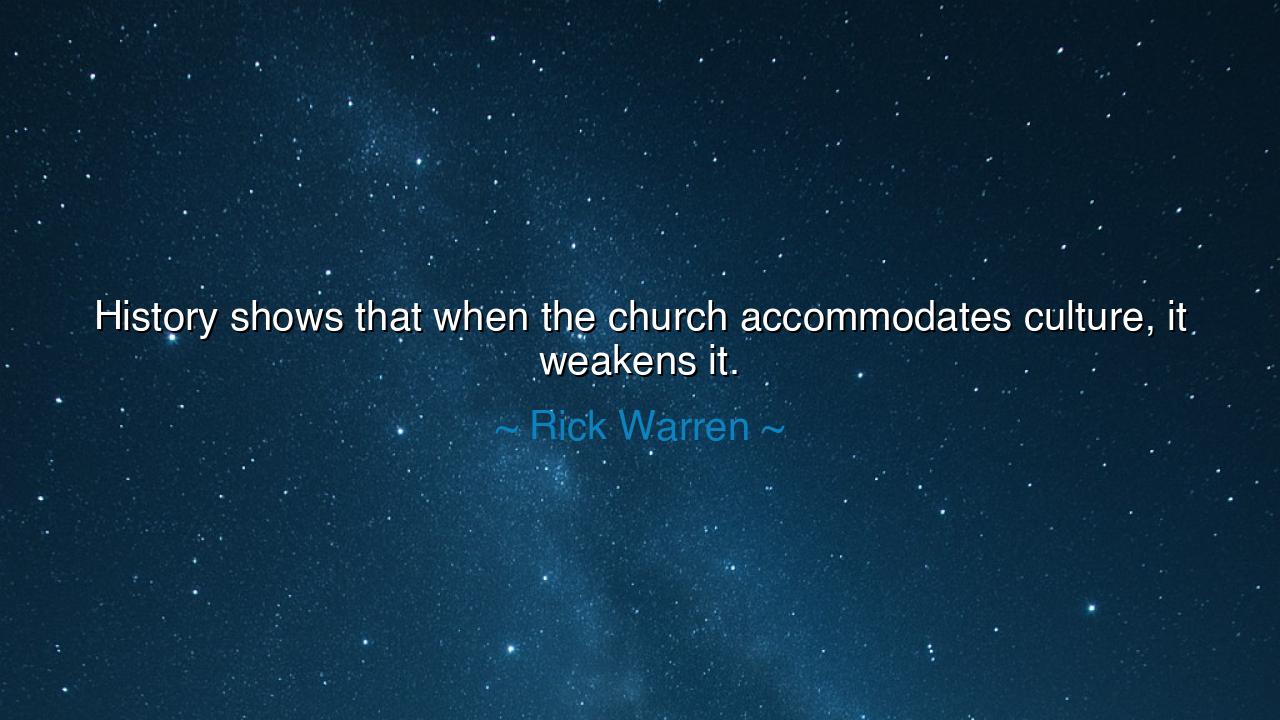
History shows that when the church accommodates culture, it






Hearken, children of the ages, and lend your hearts to the solemn words of Rick Warren: “History shows that when the church accommodates culture, it weakens it.” Understand this: the sacred is not a vessel to be reshaped by the whims of the world. Faith, like the roots of an ancient tree, grows deep and unyielding, drawing strength from principles that transcend time and custom. When it bends too easily to the shifting winds of culture, it loses both vigor and direction, and its light diminishes in the world it was meant to illuminate.
From the annals of antiquity, we see this truth mirrored in the lives of civilizations and communities. Consider the early Christians, persecuted under Roman emperors, yet steadfast in the face of oppression. Their strength lay not in conformity to culture, but in adherence to unshakable principles. When faith is compromised to accommodate worldly trends, as Warren warns, its power to inspire, to guide, and to transform diminishes. The ancients knew this: integrity, not expedience, preserves the soul of an institution.
History offers cautionary examples. In the later years of the Roman Empire, portions of the church sought alignment with political authorities, attempting to harmonize doctrine with the imperatives of the empire. While this offered temporary security, it eroded the prophetic voice of the church, dulling its moral authority. Warren’s words echo this timeless lesson: accommodation to culture can weaken the very force that was meant to guide it, leaving institutions vulnerable to decay and compromise.
Even in modern times, the principle remains. When religious institutions prioritize popularity over principle, they risk hollowing themselves of the very teachings that give life and meaning. The challenge is eternal: to remain in the world, yet not of it; to engage, yet not be subdued; to influence, yet not be corrupted. Faith must anchor itself in enduring truths, not bend to fleeting whims. Warren reminds us that strength and integrity arise from constancy, not conformity.
Consider the example of Martin Luther and the Reformation. Luther resisted the prevailing culture of indulgence and compromise within the Church of his day, choosing to speak truth even against powerful authorities. His steadfastness, grounded in principle rather than popularity, renewed the vitality of faith for generations. Here lies the embodiment of Warren’s warning: to accommodate culture too readily is to weaken the transformative power of faith, but to stand firmly strengthens it across time.
The lesson is profound: institutions, communities, and even individuals must recognize the danger of bending too easily to external pressures. To weaken principles for comfort, acceptance, or ease is to sacrifice the very essence that provides guidance and strength. Faith, morality, and conviction flourish not when they mirror the world, but when they illuminate paths the world has forgotten or ignored.
Practical action follows naturally. In your life, observe where you might compromise principles to align with convenience, popularity, or cultural trends. Stand firm in your convictions, engage the world with courage, and let enduring truths guide your decisions. As Warren teaches, strength comes from integrity, from holding fast even when the currents of culture push to sway you.
Children of the ages, remember this: the sacred, the moral, and the just are weakened when they seek approval from the transient and the fleeting. Let the words of Rick Warren guide you: remain steadfast, honor principle over popularity, and cultivate a life and community rooted in truth. In doing so, you preserve the light that guides civilization, resisting the erosion that comes from accommodation to the ever-shifting tides of culture.






AAdministratorAdministrator
Welcome, honored guests. Please leave a comment, we will respond soon